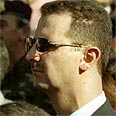
Syrian troops fire at protesters; at least 6 killed
Snipers target civilians as thousands of protestors hit streets, chanting anti-Assad slogans
Security forces and snipers opened fire on thousands of protesters Friday, killing at least six people as mass arrests and heavy security kept crowds below previous levels seen during the two-month uprising against President Bashar Assad, activists said.
A leading human rights activist said three people were killed in Homs, two in Damascus and one in a village outside Daraa, the southern city where the revolt began two months ago. He asked that his name not be used for fear of government reprisal.
"At first they opened fire in the air, but the people continued on their way, and then they shot directly into the crowd," an eyewitness said by telephone from Homs.
He said security forces dressed in black along with shadowy, pro-regime gunmen known as "shabiha" were doing the shooting.
Human rights groups say more than 775 people have been killed since the start of the protest movement in mid-March. The violence has become a deadly cycle each week, with protesters taking to the streets every Friday only to be met with bullets, tear gas and batons, with funerals a day later.
'Tragic in every sense of the word'
On Friday, despite the crackdown, thousands of people shouting "The people want to topple the regime!" returned to the streets to demand an end to Assad's regime. Video posted online also showed protesters in some areas chanting: "We don't like you!" and "Bye bye, Bashar."
Soldiers occupied mosques and blocked off major public areas to head off protests, but demonstrations erupted anyway in several major areas - including cities where the government response has been particularly severe, such as Homs and Hama.
The rallies also spread to new areas of the capital, suggesting opposition to the 40-year Assad dynasty remains unbowed despite one of the most violent crackdowns of the Arab Spring.
Still, the turnout appeared to be lower than in previous weeks - something that protesters attributed to the widespread deployment of soldiers and security forces who prevented people from leaving their homes, even to attend Friday prayers.
"The army has transformed major mosques in the city into military barracks where soldiers sleep, eat and drink," said a resident in the coastal town of Banias, where some of the biggest protests have erupted in recent weeks.
"They've put up barriers and sandbags around the mosques," he said.
Up to 1,200 security forces have been deployed in the public square in the center of town, and soldiers and armed thugs have broken into shops, offices and homes to intimidate people, the resident added.
"It is tragic in every sense of the word," he said.
- Follow Ynetnews on Facebook










